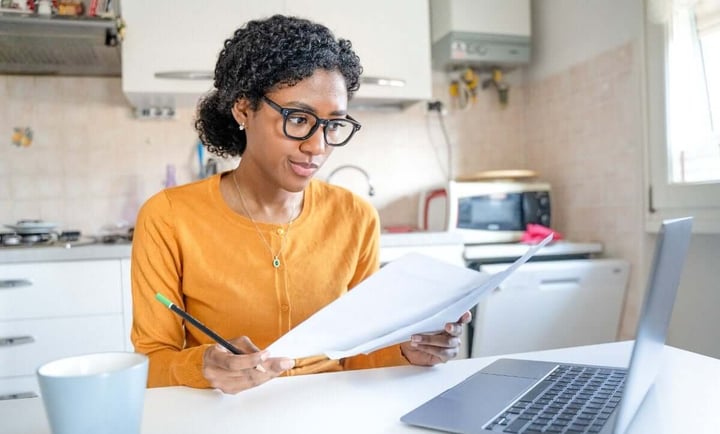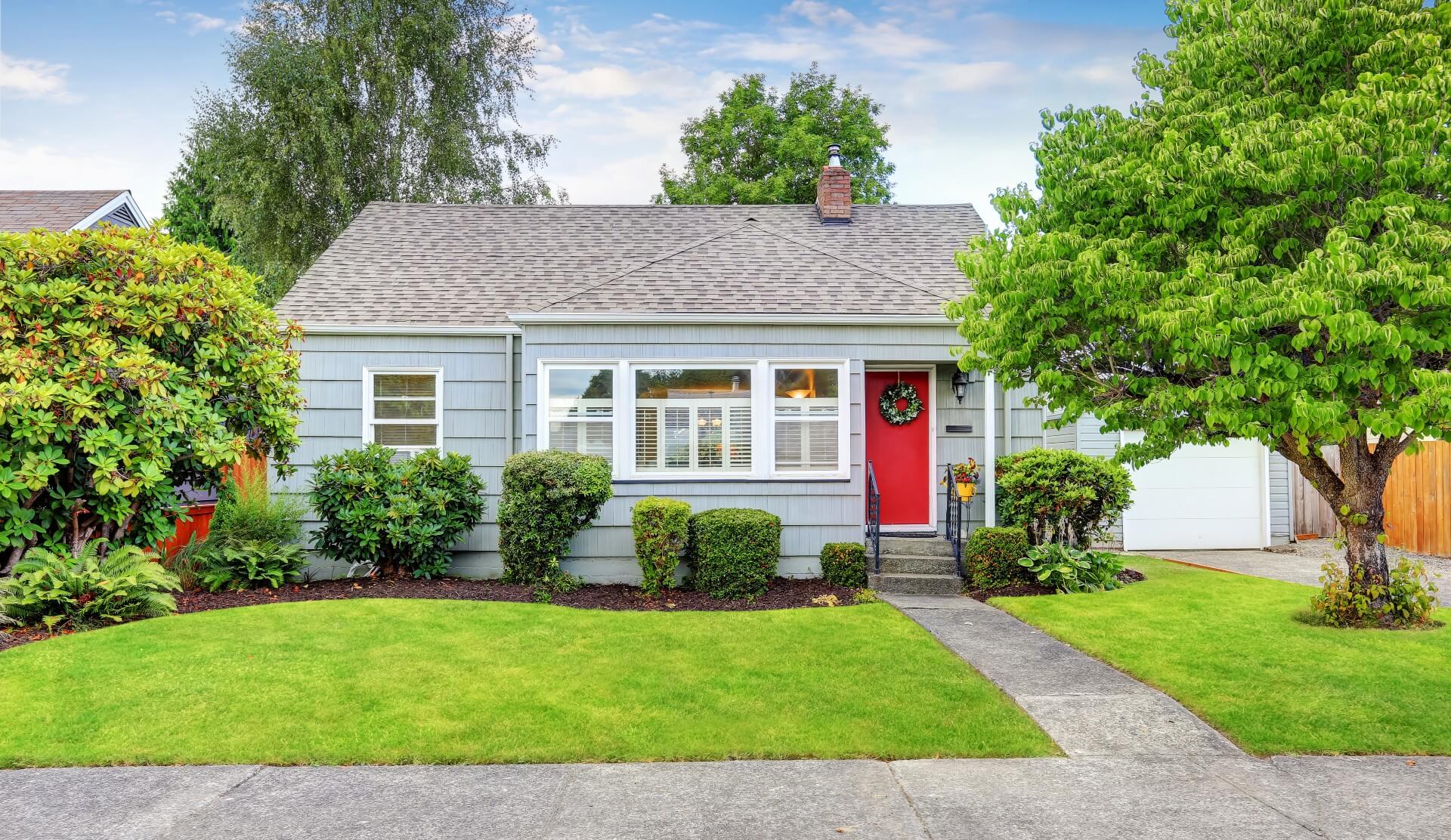
How Much Money Do You Need for a $400k House? Let's Break it Down
Posted on Mar 30, 2023
We know how tempting it is to scroll through Zillow looking for houses. It’s like online dating,...

Posted on Mar 30, 2023
Often the first thing someone does when they think about buying a home is: scroll through Zillow or Redfin. However, what’s often lacking is context. Although these sites often give a helpful estimate for monthly costs, they’re based on certain assumptions (about the down payment, your credit score, the mortgage rate, etc.) that may not hold true for your home.
In fact, the difference between their monthly estimate and what you’d actually pay is often off by hundreds of dollars.
It can be super helpful for homebuyers to see different payment scenarios in order to get a better idea of what they can afford.
Here’s what you need to know about buying a $500,000 home.
Let's talk about the down payment and the difference it makes in your monthly payment. For a $500,000 home, a 20% down payment would be $100,000. At a 5.5% rate, the monthly payment for this would be $2,940 (this includes taxes and insurance - scroll down to see how much local taxes can impact your monthly payment and may alter this number for you).
However, not everyone has that much cash on hand. With a 10% down payment ($50,000), your monthly mortgage payment (excluding taxes and insurance) would be approximately $3,430 - significantly higher than the $2,940 in Scenario 1 with a 20% down payment. You'll also have to pay for private mortgage insurance (PMI) until you reach the 20% equity mark, which can add several hundred dollars to your monthly payment.
If you’re wondering about the minimum down payment, you can put down as little as 3% with a conventional mortgage. That comes with a cost, of course - you’ll have higher monthly payments as well as PMI to pay off. Together, this can translate into hundreds of dollars more per month. For a $500,000 home with an interest rate of 5.5%, 3% down works out to $15,000. Per month, homebuyers would need to pay $4,023.
Keep in mind that all the numbers in these scenarios are approximate - taxes can vary hundreds of dollars a year depending on where you live, and other fees (like HOAs for condos) can also alter your monthly payment.
What if you negotiate and end up purchasing the house for $490,000 instead? That's a $10,000 difference - not too shabby. Using the same assumptions as Scenario 1, your monthly mortgage payment would now be approximately $2,880. That's a savings of $60 per month, or $710 per year. Plus, you'll have an extra $10,000 in your pocket to put towards other expenses (or maybe a celebratory dinner!).
On the other hand, if you've fallen in love with this house and suspect there are competing offers, it's important to weigh whether $60 per month is worth the gamble.
Now, let's say you stick with the $500,000 asking price, but end up with a slightly higher interest rate of 6.0% instead. Using the same down payment and mortgage term as Scenarios 1 and 2, your monthly mortgage payment would now be approximately $3,065. That's an increase of $125 per month, or $1,500 per year, compared to the 5.5% interest rate in Scenario 1. Over the course of your mortgage, that difference could add up to thousands of dollars. So it's worth shopping around and trying to get the best interest rate possible.
Here's why everyone was trying to buy a home when the interest rate fell: their rates meant it was less expensive to borrow! You can still tap into lower rates, though, by buying down your rate or opting for an adjustable rate mortgage (if you plan to move before the fixed rate period ends). With a 4% interest rate, your monthly payment drops to $2,304 - a savings of $640 per month over the 5.5% rate, or $7,680 per year.
If you want to know what interest rate you qualify for (which likely won't be exactly the same as the national average), get in contact with a Realtor and mortgage advisor - like ours. It's free and comes with no obligation - but they can help you figure out exactly what you can afford.
As you can probably tell from the above scenarios, there’s no one right answer to “how much.” It will depend partially on how much money you have, how much you feel comfortable keeping, and what you want your monthly mortgage payment to look like.
One thing you'll need to pay for immediately is closing costs (like mortgage origination fees, the inspection, and more). On average, closing costs for homebuyers range from 3% to 6% of the loan amount. If this seems like a big range, it is!
This is partially because each state has different standards or requirements for what buyers have to pay for. In one state buyers might be responsible for 50% of the transfer tax, which is usually several thousand dollars; in another state, that may be entirely the seller’s responsibility.
You might also experience different closing costs depending on where your home is located, whether you have an HOA, etc.
And since some of your closing costs are dependent on the loan amount, your costs will change depending on how much you put down.
If we assume that for a $500,000 home you put 10% down, then your range for closing costs would be $13,500 - $27,000.
Remember, closing costs are simply the fees you need to pay to close on a house. They are separate from the down payment.
So if you were going to put 10% down ($50,000) and pay 4% in closing costs ($18,000), you’d need a total of $68,000 to close on your house.
What’s the lowest possible amount of money you’d need to buy a $500,000 home? If you put down 3% ($15,000) and spent the low-end of 3% closing costs ($15,000) you’d need $30,000.
Of course, you don’t want to move into your new home with $0 in the bank. Not only can unexpected costs pop up with an unfamiliar home, but you want to protect yourself against the unknown - if you lose your job, for example, or have to deal with an expensive car fix.
Most experts recommend having enough cash on hand to cover at least 3 months’ worth of living expenses. To cover your mortgage alone, you’d want to have around $8,600 set aside. Assuming that your monthly living costs beyond that could be pared down to twice the mortgage if necessary, then you probably want a minimum of $17,000 to cover expenses.
So if you take the minimum living expenses for three months plus the 10% down and 4% closing costs, you’d want about $85,000 on hand when you go to buy your $500,000 home.

Let’s go back to basics: do you make enough money to afford this home? It will depend on several factors, not just your salary (though that's a big part of it).
If you (or your partner, if you’re buying the home together) have bad credit, lenders will charge you more to borrow. We’re going to assume a good credit score for the below examples. If your score is bad, check out our guide for improving it before moving forward.
On the other hand, if you've saved enough for a high down payment, you can easily afford more house on less salary.
As we’ve discovered already, the mortgage rate has a huge impact on how much money you need to make in order to afford this home - a friend who bought a $500,000 house last year when the rate was much lower may have a lower income than what's required for today's rates.
Income needed to qualify: $93,600 per year
So what does this look like if you can't put as much down?
Income needed to qualify: $128,640 per year
What about with a lower interest rate?
Income needed to qualify: $75,960 per year
And what about a higher rate?
Income needed to qualify: $119,810 per year
Note that these figures are based on general assumptions and do not take into account individual factors such as credit history, employment status, and other debts. The income needed to qualify may vary based on these and other factors. It's always a good idea to consult with a lender or financial advisor to get a more accurate estimate of what you can afford.
Most buyers pay their taxes as part of their mortgage payment - and agents usually estimate monthly costs for them this way - so taxes shouldn’t come as a surprise amount. Taxes vary greatly by locale - not only state to state or city by city, but even neighborhood to neighborhood.
A home listed for $500,000 in the Dickinson Narrows neighborhood of Philadelphia has estimated property taxes of $149 per month, whereas a home listed for the same price in the neighborhood of Society Hill has estimated taxes of $340 per month.
That might seem like a lot - but if we cross the river and look at a same-priced home in Haddon Township, New Jersey, property taxes are a whopping $930 per month (NJ property taxes are the highest in the country).
In other words, taxes are dependent on location, not just price.
Two different families can both buy a $500,000 home and have different monthly payments and different income requirements, depending on individual finance factors.
By negotiating the purchase price, securing a lower interest rate, and putting down a larger down payment, you can potentially save thousands of dollars over the life of your mortgage - making it easier to afford a $500,000 home.
So, before you dive headfirst into homeownership, take some time to do the math and make sure you're making the smartest financial decision for your unique situation.
Subscribe to our newsletter to get essential real estate insights.

Posted on Mar 30, 2023
We know how tempting it is to scroll through Zillow looking for houses. It’s like online dating,...

Posted on Mar 30, 2023
It’s a tough housing market for first-time homebuyers. Not only have home prices continued to...

Posted on Mar 30, 2023
Over the past several years, the average cost of buying a home has skyrocketed in most areas of the...